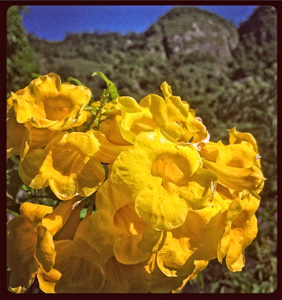
I haven’t written much of anything in a long while. A few people have asked me how things are, and honestly, I haven’t known how to answer. So I thought I’d take a few minutes to catch you up on both Tapuio and me.
Most of you know that since 2010, I’ve spent my week in Iconha and Piúma, only returning to Tapuio for the weekends. I rarely got to spend more than three days straight at home. I like to eat and my students aren’t going to make the treacherous drive up the mountain just to learn about the mysteries of the French or English verb.
In December of 2015, the driver of an enormous truck barreling through the center of Piúma decided my little bicycling self was just too minor a nuisance to concern himself with. As he passed me on a street just slightly too narrow, his truck latched onto my bicycle, dragging me then throwing me onto the street. He drove on, leaving me face up in the middle of the street, furiously asking myself why I wasn’t living in my house.
Two weeks later, I was back in Tapuio, this time permanently. I didn’t have any students. I didn’t have internet. I had very little money. My motorcycle was falling apart, leaving me on foot. The road was so bad that even if my motorcycle were in working condition, I’d still be grounded.
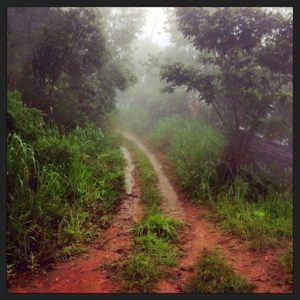
One week later, I had five students and a classroom, ceded by the church in Tocaia, 6 kilometers down the mountain. I began the almost daily trek down to teach, then back up to my house, 12 kilometers a day, rain or (blazing hot) sun. If I had to go to Iconha, that would add another 12 kilometer round trip. So 24 kilometers a day, often not getting home until 10 or 11 at night.
My students were kind enough to give me rides up the mountain, which helped considerably. Still, there was a kind of beauty trudging up the mountain on the narrow dirt road winding through the fields and forest. Animals, some of which I could identify and some which I could not, would often accompany me.
There are grasshoppers here that are easily 6 inches long, emerald green with scarlet wings. When they fly they sound like prop planes but they look like fairies. I would watch them flying through the night.
My little cat would often walk half way to meet me, pouncing out of the brush to scare me. He’s not a vocal cat, but I’m sure his little heart was laughing.
I lost a lot of weight. And there were times walking up the mountain that I thought it’d be better just to sit down on the side of the road and sleep forever.
But I had a goal. Salve Tapuio.
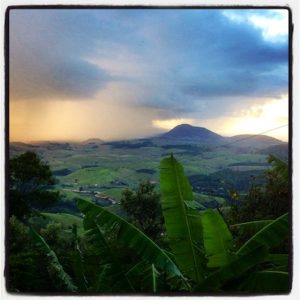
In January 2015, one year before returning permanently to Tapuio, an illegal road was cut through a section of Tapuio, just above my house, about 70 meters above the spring that provides my water. It was a government agency that cut the road. No environmental studies were performed. No impact statements made available. Nobody cared about any possible consequences. They just brought up the heavy machinery and bulldozed their way through. It’s actually a shortcut, linking two segments of the main road which had been fenced off through a large segment in order to allow cows to roam freely.
The road was cut through a section that had a few banana plants, a little coffee (not much of either), and recovered brush with embaúba, juçara palms, native avocados, and a few guttifera trees. This is all sloping land, with inclines as much as 60º. No care was taken regarding road wash, the soil that washes off the road during rains. A couple drainage ditches were scratched into the road, draining the runoff right into the direction of the spring that provides me with my water.
As you can imagine, with the rain, silt, sand, and clay washed into the spring, filling it with deposits up to one meter deep. My water line became a mud and silt line. My faucet gave mud, not water.
Everyone here assured me this was temporary, that after awhile the road would “wash clean” and this would stop. People laughed about it.
I wasn’t laughing.
One year later I was still digging out the spring after every rain. I was on my third faucet, the silt and sand destroying them. I frequently found myself without water. The filter I use is not capable of filtering mud.
A student who worked in the municipal court system set up an appointment for me with the municipal prosecutor concerning problems in Tapuio. I met with her in January of 2016.
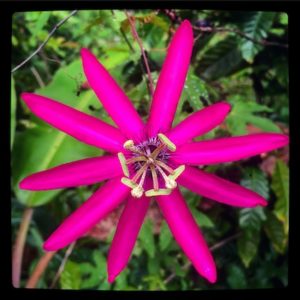
Everything here takes time. Justice is slow at best here. I had gone to the prosecutor’s office before on other issues and received no support at all. I had gone to the police several times concerning problems in Tapuio and those complaints remained open, uninvestigated. I had sought the assistance of IBAMA, the agency charged with protecting wildlife (similar to the EPA). They had taken action at times, but for the most part found Tapuio insignificant. I had sought the assistance of IDAF, the agency that oversees agricultural practices that impact flora, and I came away convinced Tapuio was doomed. So when my student set up this meeting, I had no confidence it would result in anything productive.
But I had hope. I always have hope.
The meeting was at least an opportunity for me to vent. I spoke about everything: illegal hunters, orchid collectors, deforestation, the illegal road and its effect on my water supply, the indifference of the other agencies, thefts and vandalism that I had endured at my house, ignored by the police. I didn’t hold anything back. She listened to me attentively and afterwards, my statements were written down, signed, and registered as complaints to be investigated.
I was still skeptical. But I hoped something would be done.
One month went by and I heard nothing. Two months went by and I still heard nothing. I’d pretty much decided nothing would be done and forgot about it.
During this time, the son of a landowner (we’ll call him Mark) began showing up in Tapuio with work crews, clearing out areas, burning sections of Tapuio, cutting trees. I have a longstanding battle with this guy. He is a poacher and bird catcher, a destroyer with no respect for anybody or anything. He’s the kind of guy who puts his cigarettes out on the trunks of trees then throws the butts on the ground while proclaiming his love for Tapuio. He has a habit of instructing his “workers” to cut my water line whenever they are thirsty. Sometimes they repair the line after. Often they don’t. His hunter friends also know where my water line is. They rarely bother reconnecting it.
One of the fires he set was across from my house in a bamboo grove. One afternoon he drove up, set fire to it, and after watching it burn for awhile, drove down the mountain. The flames were at least 20 feet high and burned all night, filling my house with smoke and threatening to catch my house.
The next day I went back to the Prosecutor’s office to complain about the fires.
It was now April. I had become so depressed and convinced nothing would be done I decided the best thing I could do would be to sell my houses and move to a place where people cared a bit more. II had spent years trying to get people to care about Tapuio. After 8 years, I was seen as the problem. Tapuio was seen as an abandoned backwood spot of nothing worth caring about, a place for poachers to earn a bit of cash, a place for motorcyclists to destroy the road in the name of “fun,” a place to raise ever leaner ever weaker cows. It was, unfortunately, never seen as a place to love.
In the face of all this destruction, my only concern was to protect my investments enough to be able to sell them at decent price. Even I didn’t care any more.
I have put up with burglaries, thefts, vandalism (including feces smeared on walls and thrown on top of the house), death threats. My water line has been cut so often it pulls more air than water. My water supply has been compromised. My house is still as broken down as the day I bought it. The electric line to my other house had been cut by some unkind soul and three years later it still hangs there, unconnected, because putting it back is a job for two people and nobody will help me.
I had been beaten by a motorcyclist defending his “right” to be as destructive as he wants.
Hunters had begun returning to Tapuio and gunshots were once again common at night.I had been defeated.
Nobody cared about what was happening to me and what’s worse, nobody cared at all about Tapuio.
Then things began to change.
First, the municipal government repaired the road. It was the first time in 8 years. It wasn’t done out of any concern for Tapuio, and most definitely not out of any concern for me. It was an election year and the administration, fearful it might lose, wanted to capture every vote. The reason made me mad, but I was able to ride my motorcycle to work again. I can’t complain about that.
Second, animals of every kind began showing up at my house. Iraras and coatis and lizards and pacas wandered the yard. Snakes hung out in the kitchen. Spiders of kinds I’d never seen were everywhere. Little white and yellow butterflies by the thousands flew past my house. Porcupines, birds, monkeys, they all came to my house. A friend told me he thought they were saying good bye. I think they were telling me not to leave.
Third, IDAF came to Tapuio. They actually responded. They actually came to Tapuio! They found the road to be illegal, found the burns to be illegal, found some other infractions. Mark was fined for the burns.
This encouraged me.
Fourth, Mark paid me a visit. He drove up with some robust guy nicknamed “Martian” with the sole purpose of trying to intimidate me. He let me know how people hated me, how I was a foreigner whereas he was born here. It was a heated discussion. I was not intimidated. It’s kind of hard to intimidate me.
Instead of intimidating me, I felt motivated to stay and fight him, his attitudes. I no longer wanted to leave.
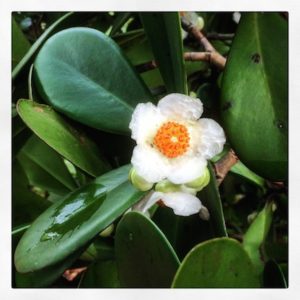
After Mark’s “visit,” It seemed like things had stalled. My water was still muddy after every rain. The burning had stopped but the clearing had not. Mark paid regular visits to Tapuio, just to show he is the boss.
I always know when he is driving up. You can hear him quite literally a mile away, talking loudly, laughing loudly, driving as if the road were a thing to be defeated. He and his crews would plant beans, corn, manioc. They would cut bananas and clean out any volunteer trees. Most of the time he doesn’t even bother to harvest anything he plants. His reason for planting is simply to show he is boss.
One day a small bulldozer showed up in Tapuio. The municipal government had loaned a small bulldozer to create more roads up here. Mark decided he needed a small road cut into the brush just short of 30 meters from the spring. It cuts in through the brush into an area where he has no bananas, no coffee, and no corn and goes about 100 feet to a rather massive rock outcropping with a huge ficus curling down the front of the rock face, something like you might see in travel shots from Bali or India. What was the purpose of the road? To show he’s the boss.
And, of course, to damage the water source, which it did beautifully.
I took pictures of it all, along with pictures of the damaged spring, which I took to the Prosecutor’s office as well as to IDAF.
During all this time investigations were still ongoing about who is responsible for the first road. No one claimed responsibility.
IDAF investigated this second road and found it to be completely illegal. The area would have to be reforested. (This was not done. Instead, bananas and grass grow in the middle of the road and corn has been planted below it, less than 15 meters from the spring.)
A few weeks later, I didn’t have any water at all. I went up to the spring only to find someone had stacked rocks and mud on top to the point of cutting off my line. I repaired my line and immediately reported this to both the Prosecutor’s office and IDAF. They didn’t seem too interested.
Shortly after this, i became ill. Vomiting, diarrhea, abdominal cramping, fever. I didn’t go to the hospital in part because they would want me to stay there and nobody would care for my cat.
I went for a walk and found someone had used herbicides around the spring. The containers were still on the side of the road. People here mix Roundup with other toxins, making a cocktail of death which they spray all over everything. The poisons were in black oil containers. No longer in the original containers indicates this is what had happened.
There’s only one person it could have been.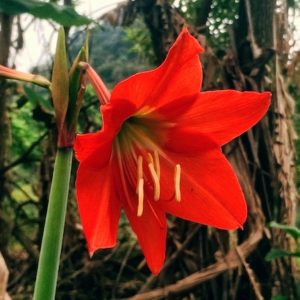
The next day, I went to the hospital and to the prosecutor’s office. The doctor prescribed antibiotics and blood work but explained that the blood work was unlikely to show the nature of the toxins.
The prosecutor’s office referred me to the police. Never having had any luck with the police, I was hesitant to go to them. Instead I went to IDAF. The agents there promised to respond swiftly.
Before returning home, I decided I would try the police one last time. I’m glad I did.
They had overhauled the department and changed officers. The new officers were dedicated, professional, concerned. They took this matter seriously. It was the first time in 8 years they had taken any of my concerns seriously. I went home feeling like maybe, finally, something would be done.
IDAF also responded immediately. Their investigation found the poisons. Mark was fined for his use of toxins in the vicinity of a spring. The case has been sent on to the Prosecutor’s office for investigation into possible criminal proceedings and more fines. They contacted the police who are already gathering evidence of criminal conduct. They called Mark in for questioning and he immediately denied having any knowledge of the matter, claiming it was his worker who used the poisons. His worker is a 60 something man who walks up to Tapuio carrying a rucksack with his lunch.
Mark also asked if it would be permissible for him to cut off my water. Absolutely not.
He then asked if he would be the suspect should anything happen to me. (He seriously asked this!)
Absolutely.
I don’t know about you, but I’m feeling so safe right now!
Or not.
That’s pretty much how things stand at the moment.
What can I expect here?
The election is over, so the municipal government will abandon the area until the next election cycle, 4 years from now. The rains are already destroying the road.
A bad road is a mixed blessing. Fewer people come up, but at the same time sports motorcyclists show up in greater numbers.
Banana and coffee producers depend on trucks to retrieve their produce. With a bad road, the trips become more perilous. Drivers occasionally charge to come here.
Emergency vehicles cannot make the trip up the mountain.
At the same time, dreams of “development” are put on hold.
That is a good thing, because “development” here is rarely beneficial.
What are Mark’s goals? If you talk to him, he suffers an undying love for this place. After all, he was born here. He’ll be quick to tell you that. His undying love must be the reason he kills all the wildlife, traffics the birds, cuts and burns the trees. He’ll tell you he depends on the little agriculture he practices. That’s why, I guess, most of the time it just falls and rots. He’ll tell you he wants to see this area preserved. That’s why he once had the entire area mapped and measured, lotted off, in order to convince his father to build houses and sell lots. Fortunately, his father refused. So now, he’s awaiting his father’s death. He’s the sole inheritor. He will turn everything into small lots with small houses, summer homes for tourists who believe in loud music, loud barbecues, lots of dogs, lots of beer; tourists who love the idea that they are out in the country, but who are terrified of anything and everything that’s part of the country.
Worse still, there isn’t enough water anymore for this kind of development. It would be a social, ecological, environmental nightmare.
What are the municipality’s goals for this area?
Goals? What are those?
Planning? Planning’s for wimps.
Does anybody have any vision for this area?
Some do. Some believe this area should become a park. It’s beautiful here. It could be reforested. Wildlife would return. Agriculture would stop. Security of the area would be guaranteed.
I would have to move out.
Those currently responsible for the security of this area are the same ones who would be responsible for security here if this were transformed into a park, and they already do not provide adequate security.
Hunting would increase because there wouldn’t be anyone here to stop them.
Parks here mean leisure and leisure around here means cheap weekend and summer rentals, lots of barbecue, lots of noise, lots of trash, lots of drinking, lots of fights. This already exists down the mountain. It would only get worse.
Maybe an NGO? Great! Know any that might be interested in helping out? All those I’ve contacted are either completely uninterested or ego driven, and an ego driven NGO rarely produces good results.
I’ve thought about starting my own NGO but I’m alone in this. Nobody is interested. Of course they don’t say that. They just don’t say anything. I understand. It’s hard to see any benefit in buying the battle to protect such a small and insignificant area.
Is there a solution? I think so.
I see the answer in the establishment of a small alternative/artistic community, 7 houses at the most. No children. Its too dangerous. And no dogs. Each house would have a methane digester for creating cooking gas and lighting. Electricity would be solar: the local energy network is too unstable. Each house would have a garden area. No other agriculture would be permitted.
The inhabitants being artists, they would have a tranquil environment in which to work. Internet is available in the area so people would have access to markets. And for anybody interested in selling locally, BR 101, the longest federal highway in Brazil, cuts through the center of the city. Guarapari is only an hour and a half away. Vitória is two hours away. Rio is 7 hours away.
The presence of this community would have the effect of immediately ending all illegal activities in the area: hunting, pesticide use, deforestation and habitat destruction. Reforestation would protect and increase water levels. No more motorcyclists destroying the road. No more vandalism. No more destruction.
Perhaps Tapuio could even become a center for environmental research.
That’s my dream. This is what I would like to see. This is what I think is practical and doable.
Anybody interested?
So this is what has been happening in Tapuio in the last year. The legal proceedings are advancing. Many people feel I should simply back off, let Mark do what he wants. People who feel that way don’t have to deal with his destruction.
How have I been this past year?
I have gone back and forth between energized and happy, and depressed and unmotivated. I am not infrequently angry.
Mostly, I teach, come home, watch Netflix, and go to bed. Occasionally I sit outside, watch the sunset, watch the sunrise.
My garden is looking better after a hot summer.
Current projects include a solar cooker which I just completed last week (made rice). I hope to paint my house with natural paint made from local dirt this fall. I’m working on making my own sheetrock to put in a ceiling and cover my walls. And I hope to have a methane producer up and producing by the end of this month.
The photo at the top of the page is of a plant called ipê de jardim here. Despite being native from Texas to Argentina, it isn’t native to Brazil but is considered invasive. I brought up a couple plants and it grows well around my house here in Tapuio. Despite being considered invasive, it hasn’t spread. It blooms in the hottest summers when even cacti shrivel. In Texas, the place I left to come here, it’s called Esperanza. Hope. It’s in full bloom, like it’s telling me not to lose hope.
I haven’t lost hope yet.
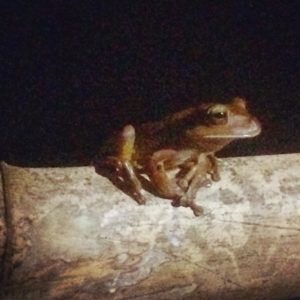
Salve Tapuio
